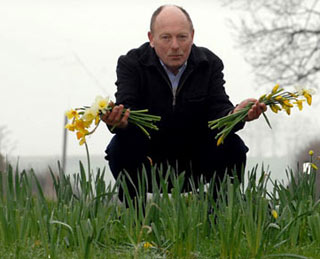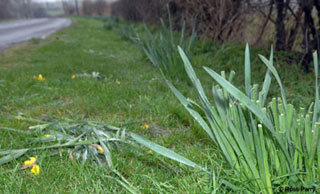Human Flower Project
Tuesday, April 03, 2007
Competition and Malice “In Bloom”
On the eve of final judging for “Britain in Bloom,” one town’s daffodils are decapitated.

Peter Dungworth and slaughtered daffodil flowers
Harthill, England
Photo: Ross Parry, via This Is London
Fortune should have smiled on a gardener named Peter Dungworth. And perhaps it had. But several human faces were evidently scowling when the 5000 daffodil bulbs Dungworth planted along Thorpe Road in tiny Harthill, England (pop. 1728) sprouted and opened up this spring.
On the night of March 24th, someone came through and snipped off every flower head. Harthill was preparing for the next round of judging in Britain in Bloom, the Royal Horticultural Society’s national landscaping contest. The RHS touts the event as “non-competitive” but what a crock! We have found that just as most roses prickle, most gardeners are intensely competitive, and when there are several fiery hoops of judging to jump through and community pride on the line (as well as substantial investments of money and stoop-work), rivalries can become nuclear.
“At first I thought it was vandals having a bit of fun on their way home from the pub but that is definitely not the case,” Dungworth told the Telegraph. “It has taken somebody or several people a few hours to carry out the work. The flowers weren’t just pulled up. They were carefully snipped off – you could say almost professionally done – with secateurs. There is no doubt this was a professional job.”
 Cut but not for sale
Cut but not for sale
Photo: Ross Parry
via This Is London
Some mild-mannered folks told Dungworth that the culprits were more than likely overweening entrepreneurs, who intended to sell the blooms door-to-door for Easter decorations.
“That’s nonsense,” Dungworth replied, “because the yellow flower heads were left where they were cut. I haven’t moved them.”
He suspects residents from the nearby village of Thorpe Salvin (pop. 402), which has been awarded by Britain in Bloom three times. Wouldn’t you know it? People there deny having anything to do with sabotage.
Let those who think flowers unadulterable or at least benign take a deep whiff. This is the finest little show of malice we’ve seen in months. It got us thinking about competitiveness more generally, so we snooped through some recent research on the topic. Frederick Gordon makes the case for competition. One example: “Shakespeare and Marlowe were rival playwrights. Early in his career, Shakespeare wrote comedies, while Marlowe was writing tragedies. Shakespeare was appalled to discover that people considered Marlowe to be more important because tragedy was thought to be a more profound form of drama. So, Shakespeare sought to demonstrate that he could indeed write tragedies, and better ones than Marlowe. This competitive effort drove his career.”
And in fact, this kind of friendly rivalry is what the RHS had in mind with “Britain in Bloom”—a contest that could enhance the nation’s overall beauty.
“The moral value of competition,” Gordon writes, “depends on whether it is an effort to win by doing better than others vs. to win by making the other do worse.” Chopping off 5000 daffodil heads falls with a klud on the dark side of that line. And, from Gordon’s summary, it appears that most research has emphasized the malicious and destructive aspect.
Gordon writes that competition is good when it displaces mediocrity from power, when it teaches how to manage success and failure, and (to use a gardening metaphor) “when it plants a grain of discontent in the self-satisfied and self-involved.” We found especially interesting his spur to explore the nature of competition itself.
 Secateurs
Secateurs
Photo: via wiki
“Does competition eliminate corruption, create a social order which is legitimate and rational. Does it increase productivity? Does it tend to protect human rights? …We might also ask not just what value comes from competition, but what of value is in competition: Why is it so important to people to know where they stand relative to others? Why does equaling or exceeding a standard or achievement set by others so engage motivation? In short: how do we value the drama of competition relative to other forms of social interaction?”
We think gardening, gardeners, and such potential malice-fests as “Britain in Bloom,” would be excellent places for social psychologists to plunge in. (Scholars, please checking all secateurs at the door.)
Culture & Society • Gardening & Landscape • Secular Customs • Permalink




